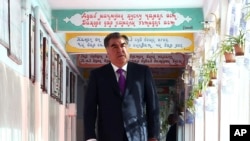People in the Central Asian nation of Tajikistan have voted overwhelmingly to approve changes to the Constitution allowing the longtime authoritarian president to rule indefinitely, election officials said Monday.
An initial count showed 94.5 percent of voters had supported amendments that included a provision to scrap presidential term limits.
The referendum was held Sunday with only cursory international scrutiny. No election in Tajikistan has ever been deemed free and fair by the most thorough international vote-monitoring organizations.
The former Soviet state has in recent months been the setting of an intense onslaught against fundamental political freedoms. Almost the entire leadership of the most popular opposition party has been tried over an alleged attempted coup and they are awaiting lengthy jail sentences.
Emomali Rakhmon, a 63-year-old former collective farm boss, has ruled Tajikistan since 1992.
Although Rakhmon will now be able to run for office as many times as he wishes, another constitutional change ushered in by the referendum allows his eldest son and presumed heir to take over power. The minimum age at which candidates can run for the president is being lowered from 35 to 30, making 29-year-old Rustam Emomali eligible to stand for office in the next presidential election in 2020.
Tajikistan is a predominantly Sunni Muslim nation, but the authorities have for years been engaged in a battle against manifestations of perceived excess piousness. Young men are regularly detained for sporting beards and women are forced to cast off veils. While most Tajiks would identify as practicing Muslims, radical strands of the faith enjoy relatively limited support in the country.
Instability in neighboring Afghanistan, with which Tajikistan shares a porous 1,300-kilometer (810-mile) frontier, has been central to the government's mantra of retaining stability at all costs. In recognition of the potential threat from Afghanistan, the United States has provided substantial military aid to Tajikistan as part of efforts to combat terrorism and drug-trafficking. The U.S. State Department, meanwhile, has reported on a terminal decline in political, religious and media freedoms in the country.
The Islamic Revival Party of Tajikistan, or IRPT, the only opposition party with any real following, was declared a terrorist organization following an alleged coup attempt in September. Little is known of the purported plot to overthrow the government, including whether it actually took place.
More than a dozen of the party's leaders were charged with involvement in the coup attempt and have been tried behind closed doors in a case that has drawn broad international criticism.
Yet another of the 41 constitutional amendments approved through the referendum will impose a ban on religious-based parties, which is apparently a measure intended to ensure the IRPT is unable to resurface under a different guise.




